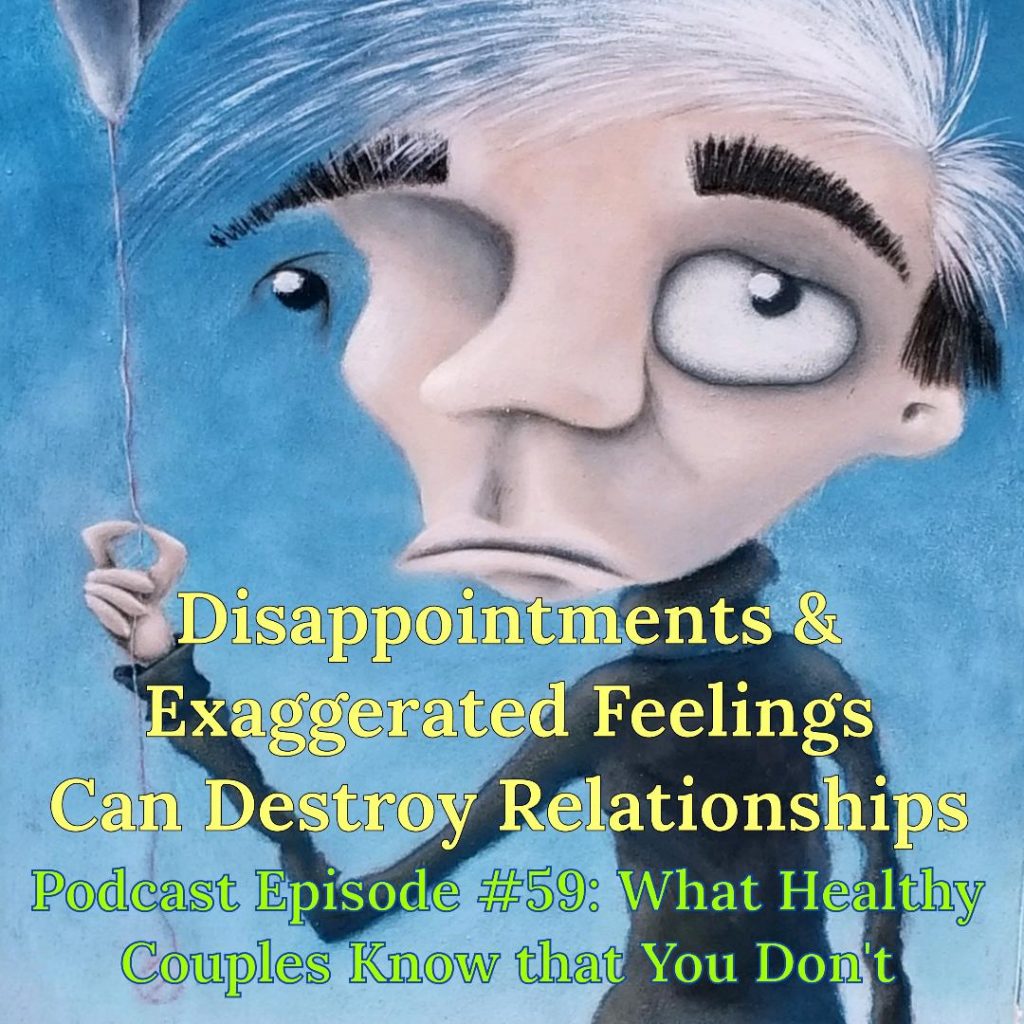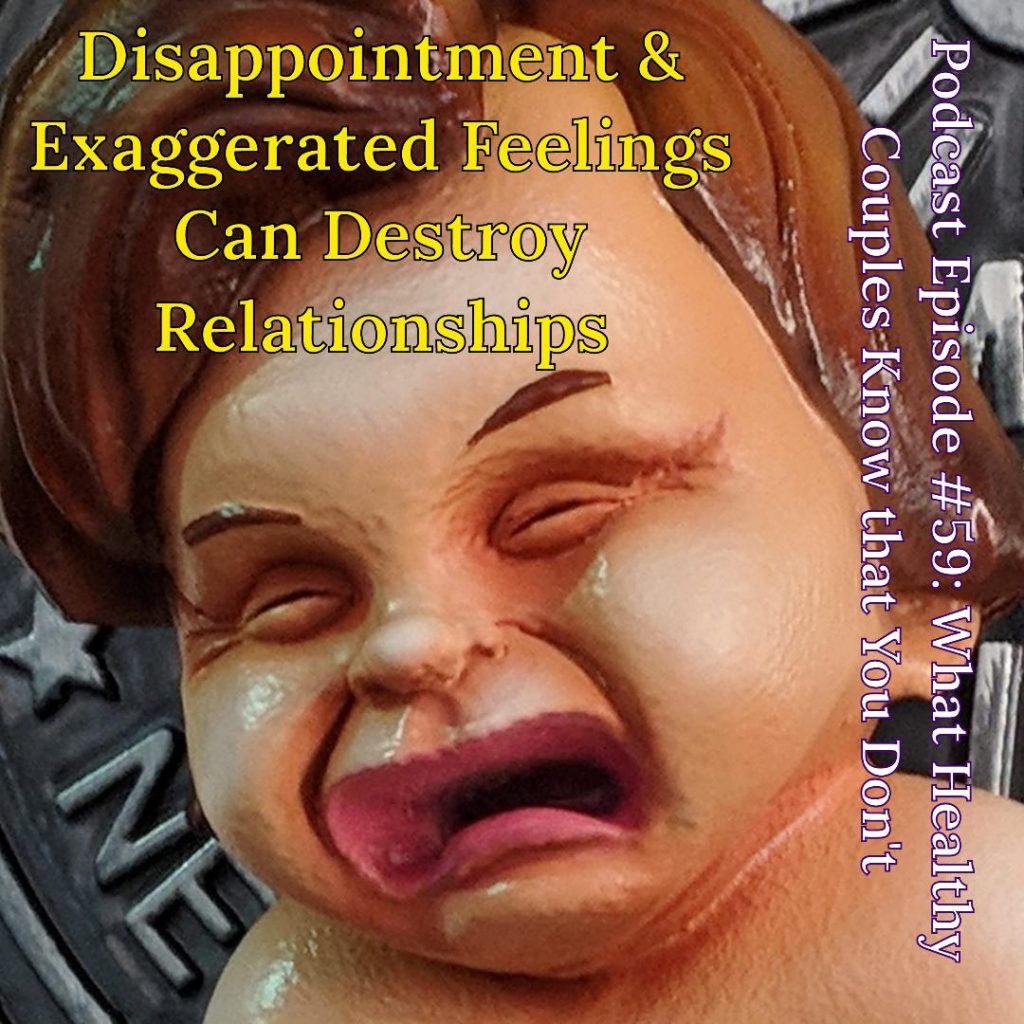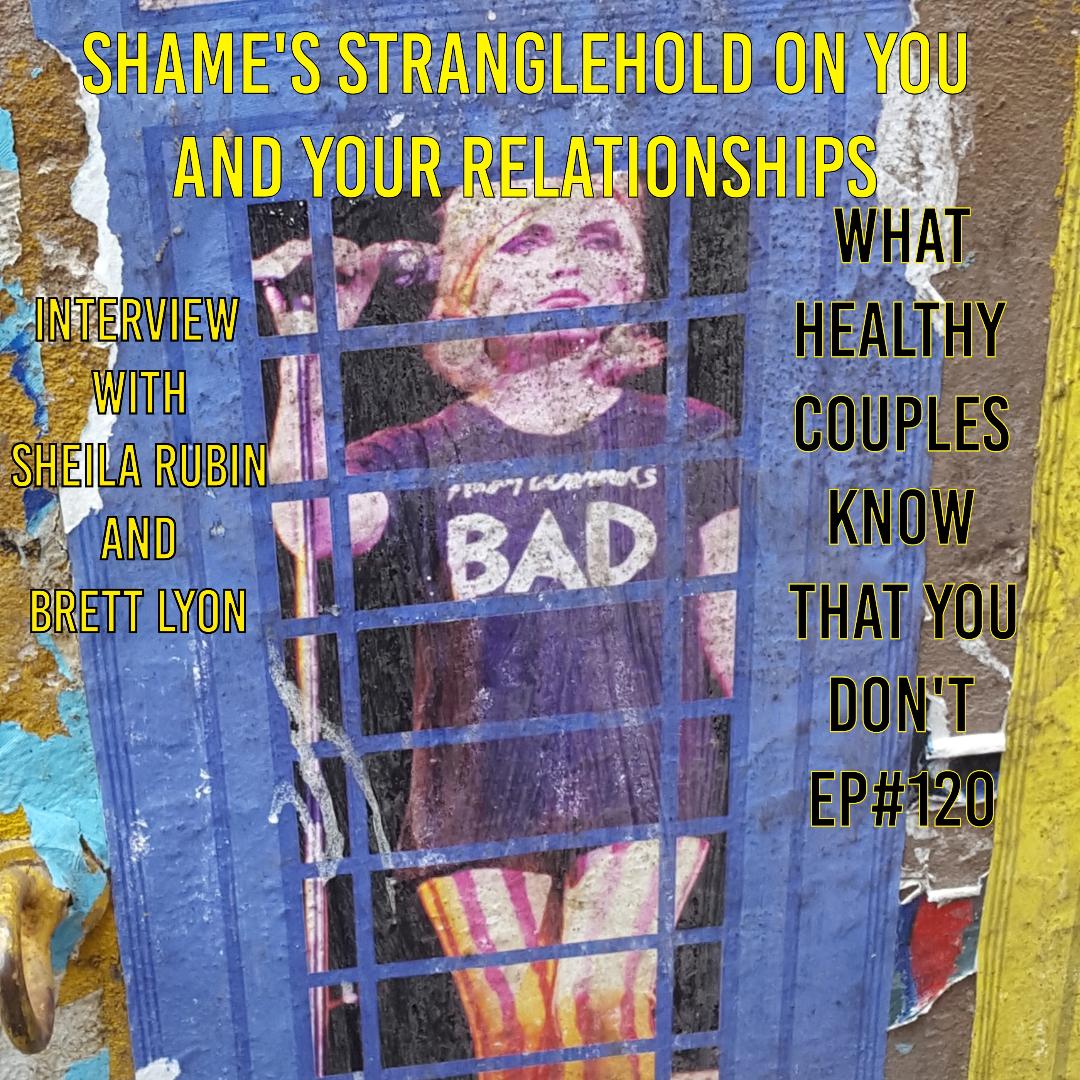Disappointment can be dangerous to relationships. We, as human beings can be very irrational when it comes to disappointment. We nurse our disappointments & they grow to take up too much real estate inside of us.

Share the Love & Spread the Word
PLEASE Tweet or SHARE on Facebook (sooooo helpful)
Subscribe on Apple Podcasts: HERE & please leave a review. THANKS!!!!!
PLEASE LISTEN ABOVE or Read Below:
Feelings are important to know who you are & how you are unique. Feelings are also too often exaggerated & most often selfish. Learning to balance your feelings by thinking things through is a great goal to improve relationships. Our culture at large indulges feelings at other’s expense, instead of learning from facts, science & truth.
My last episode was about communication & the stories we tell ourselves which lead me to considering how often feelings contaminate interactions that erase a partner’s valid point of view. The self interest driven by emotions makes us feel very self righteous & at times delighted when we erase the other person. We love being RIGHT & we love the simplicity of only loving our own beliefs.
Emotional balance requires more complicatedness. We need to learn to shuttle back & forth in between feelings & thoughts; in between the glory of simplicity & appreciating complicatedness; in between the way we believe things are & facts.
I love this quote from Oscar Wilde: “Sentimentalism is wanting to have an emotion without paying for it.” Truth lies in greater emotional balance. Emotions help us lie to ourselves on an everyday basis.
We pretend because it’s more comfortable, it’s more soothing. I don’t need to exercise to be healthy is one huge lie I told myself for 59 years. Emotional balance requires paying attention to hard truths; facing up to realities we would rather ignore.
Partner’s often can be a source of truth, a source for reality to interrupt the false stories we tell ourselves to feel ok. Maybe we need to be made of sterner stuff & not feel ok. Greater emotional balance can help you bring respect to your partner’s ideas which might even have strengths you don’t recognize.
As I’ve said before respect is more important than love.

When we get stuck in only feelings or only our thoughts we are lopsided & not in emotional balance. Feelings can be very self indulgent. Think of the power of DISAPPOINTMENT to destroy emotional balance. William Gass an author & professor said “Disappointment leads to violence.”
I thought about this a lot after my 5 year old grandson threw a hard punch at me while on vacation. He was very disappointed when I corrected him when he wanted to withhold both pirate ships from 4 year old Olive. Even after I discussed the importance of generosity he only wanted to give her the small ship & never the big one. He popped me one, taking me by surprise 15 minutes later &
he was gleeful as only a 5 year old who wants his way can be. I remember his Dad being the same way at 5 years old; we all love power in it’s many forms.
As adults we throw passive aggressive punches or emotional blows, often at the people we love the most. We can be casual about saying mean things because we are entitled because of our vast stockpile of unspoken disappointments. Our collection of disappointments takes on a life of its’ own that has completely lacks of emotional balance.
Feelings that go unchecked by thinking or facts build into false truths. False truths are a dangerous business for ourselves & for our relationship. Feelings can easily harden into being unforgiving.
Everyone in important relationships deserves the benefit of the doubt & we all require forgiveness for the terrible mistakes that we all make. It’s the curse of being human to hurt the people we love the most.
You will hurt your partner less often if you decide disappointments are a huge part of life & it’s your job to manage your disappointments so they don’t spill over onto others so easily.
What’s the best way to cope with disappointment? Reduce your expectations. (This is worth saying twice)
The reality is you have more emotional balance when you expect things from yourself & not others. Accepting & being honest about your own mistakes & how long your own learning curve is will help you soften your expectations of others. When your partner doesn’t bring you flowers does not mean they don’t love you; it most likely means they just don’t think about flowers much.
It’s just soooo easy to set yourself up for disappointment by believing “if he loved me, he would know he should do this”. Noooooo that’s not how it works. If you really want something in a relationship you need to ask & probably more than once because it can be hard to pay attention to new things.
I want to share the only quote I know by heart by Abraham Maslow: “People who suffer a lot, often times do so because they are cognitively wrong about what they think they have a right to expect.” I’m going to repeat this because it is so important. If you make this understanding part of the infrastructure of your life, I guarantee you will have better relationships, less disappointment & you will age well.
Relationships are a balancing act. Ask yourself what is the opposite of disappointment? What pops into your head? I want you to take 3 seconds & ask yourself. [STINGER NOISE}
I asked my husband his idea of the opposite was “pleasantly surprised”. This embodies a healthy attitude; surprise if it works out means you are not setting yourself up to be disappointed.
My opposite for disappointment is acceptance. Acceptance of the different values we all have, the different points of view & really understanding how messy life is & how hard it can be to be human. Accepting that everyone is wired differently and respecting the work it takes to untangle those differences & learn how to be a team.
Untangling the differences to make room for two people requires a good amount of thinking, reeling in your emotions to be able to problem solve. In HBO’s magnificent mini-series Chernobyl you watch the 2 scientists & 1 party official struggle with their emotions & they all 3 work very hard to think in order to come up with solutions to save lives. Really a marvelous example of people buried in terror & still finding emotional balance by thinking. Both emotions & thoughts are useful. Chernobyl is also powerful testimony as to the destructiveness of lying.
Let’s look at the emotional damage of betrayal. If anyone gets stuck in the “They betrayed me” emotion; while this is understandable it can defeat the possibility of repair. It’s a struggle to look at the bigger picture that includes your part in the problems prior to the betrayal. Generally when a relationship is killed off it takes two.
Another stumbling block is the false emotion of protectiveness “I don’t want to hurt you by telling the truth” is all too common. The person you are really protecting is you, the secret keeper because you want to avoid the messiness of truth & reality.
Over & over you hear me say how important it is to talk about hard things…..Nobody seems to want to do it or when they do it’s half-hearted and often goes unnoticed.
It takes courage to face things honestly because honesty creates infrastructure you can rely on. Chernobyl was a disaster in part because of the lies that create an unreliable infrastructure. You can’t count on the staff of retail stores to give you an honest opinion unless you directly & emphatically ask for it. I cringe at the false drool over your purchase at the cash register; oh, what a great color. I’m so annoyed by the obvious B.S; & I hardly shop (at my age you have enough great stuff).
Being authentic means being able to recognize lies you tell yourself & understanding when you allow emotions to drive the story you tell yourself that makes you the starring role as the victim. Try using your imagination about your part in the problems. Try using your imagination that there are two starring roles; not one. See if you can shuttle back & forth between your feelings of hurt & disappointment to thinking about your responsibility in the problem.
Blame is most often false & emotion based; it’s ALL YOUR FAULT is a very comforting story we all love to tell ourselves. Blame is childish & immature. My definition of maturity is honestly facing painful situations as Fritz Perls believed many years ago.
It’s important in a relationship to grow up & recognize the complexity of every situation. If you are a people-pleaser then you should know you tell people what they want to hear instead of speaking your truth…& yes, people will like you better in the short term but long term you are planting landmines that are going to have consequences to your relationship.
If you are punishing your partner & extracting penance because of your disappointment STOP & ask yourself how clear have you been; have you asked for what you want? Have you had 15 conversations instead of 1 or 2 attempts?
Healthy relationships are a balancing act. Know that we all will be disappointing to each other; it is an inevitable reality. Don’t indulge your disappointments; Instead create conversations where you both have an opportunity to grow & learn.
The cool thing about relationships is how much you can learn about yourself. It’s a gift to learn to not point the finger at someone else until you’ve looked at yourself.
* My challenge for you today: The next time you start a conversation in your head blaming your partner; stop & ask yourself what have I done to contribute to this problem?
Rein in your disappointments & stop them from piling up by having a more direct conversation which will make you more trustworthy.
If you don’t feel able to have that hard conversation; then start with “I don’t think we talk about hard things or what’s missing in our relationship enough. How about we each write down one thing we’ve been avoiding talking about & try to make things better?”
& finally practice balancing your emotions by thinking through whatever is bothering you. It’s embarrassing for me to admit; but I remember when a therapist told me in the 70’s that I could think & feel at the same time. I honestly did not realize that…….thank goodness we all get a chance to learn new things our entire lives!













